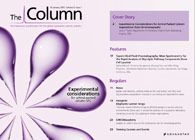Spider sense
Spiders face potential predators on a daily basis, yet, surprisingly, ants are rarely reported as foraging on the webs of orb-weaving spiders. A recent study has found a novel way in which spiders ward off ant invasion.
Spiders face potential predators on a daily basis, yet, surprisingly, ants are rarely reported as foraging on the webs of orb-weaving spiders. A recent study has found a novel way in which spiders ward off ant invasion.1
The team conducted the study at the National University of Singapore where they tested the silk of orb spiders Nephila antipodiana. They found that a pyrrolidine alkaloid, 2-pyrrolidinone, is present on the silk of the spiders and this was shown to deter three species of ants.
The ontogenetic change in the production of 2-pyrrolidinone suggested that this compound represented a natural adaptive response to the threat of common enemies, rather than a by-product of silk synthesis.
Using GC–MS, the chemical was found to be present only on the silk threads produced by adult and large juvenile spiders; it was absent on threads produced by small juvenile spiders. The team believed that this was due to the thinner silk of juvenile spiders, which the ants were unable to use.
1 Shichang Zhang et al., Proc. R. Soc. B, 2011, DOI: 10.1098/rspb.2011.2193
This story originally appeared in The Column. Click here to view that issue.
Measuring Vitamin K1 Concentrations in Dogs with Chronic Enteropathy Using LC–MS/MS
May 14th 2025A joint study between the University of Tennessee (Knoxville, Tennessee) and the University of Pennsylvania School of Veterinary Medicine (Philadelphia, Pennsylvania) compared directly measured vitamin K1 (vitK1) concentrations in healthy dogs and dogs with chronic enteropathy (CE) using liquid chromatography tandem mass spectrometry (LC–MS/MS); they also investigated whether supplementation of vitK1 in dogs with CE would significantly increase vitK1 concentrations.
HPLC 2025 Preview: Fundamentally Speaking (Part 2)
May 14th 2025Michael Lämmerhofer from the Institute of Pharmaceutical Sciences, University of Tübingen, Germany, spoke to JFK Huber Lecture Award winner of 2024 Torgny Fornstedt, professor in analytical chemistry and leader of the Fundamental Separation Science Group, Karlstad University, Sweden, about his pioneering work in high performance liquid chromatography (HPLC) with a focus on fundamentals, ion-pair chromatography, and oligonucleotide applications.

.png&w=3840&q=75)

.png&w=3840&q=75)



.png&w=3840&q=75)



.png&w=3840&q=75)









